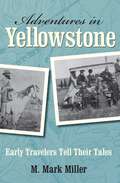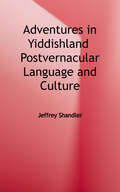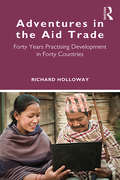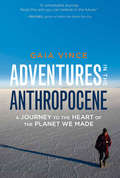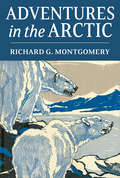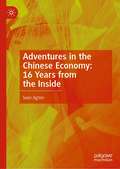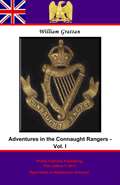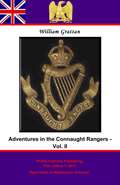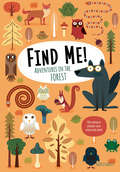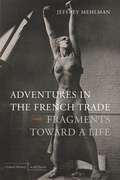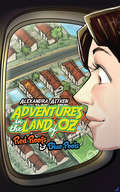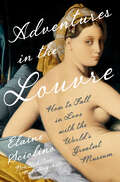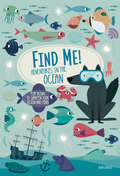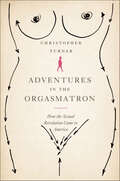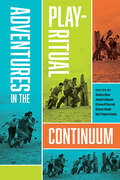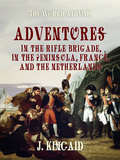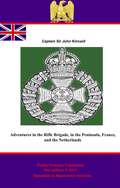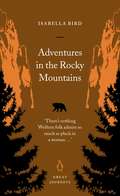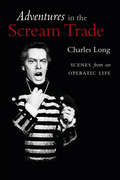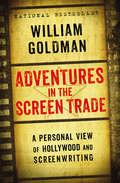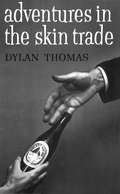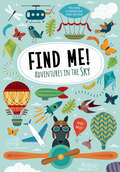- Table View
- List View
Adventures in Yellowstone: Early Travelers Tell Their Tales
by M. Mark MillerAfter its establishment in 1872, Yellowstone National Park was sufficiently famous that numerous people risked bear maulings, Indian attacks, and geyser burns just to glimpse its wonders. A surprising number of those who survived wrote about their adventures. The best of these stories are collected in Adventures in Yellowstone. Presenting a dozen narratives—journal entries, letters, and diaries—with an introduction to each, and with historic photographs, postcards, and woodcuts, this book is the essential compilation of the most gripping first-person accounts of the early years of America&’s most cherished national park.
Adventures in Yiddishland Postvernacular Language and Culture
by Jeffrey ShandlerAdventures in Yiddishland examines the transformation of Yiddish in the six decades since the Holocaust, tracing its shift from the language of daily life for millions of Jews to what the author terms a postvernacular language of diverse and expanding symbolic value. With a thorough command of modern Yiddish culture as well as its centuries-old history, Jeffrey Shandler investigates the remarkable diversity of contemporary encounters with the language. His study traverses the broad spectrum of people who engage with Yiddish—from Hasidim to avant-garde performers, Jews as well as non-Jews, fluent speakers as well as those who know little or no Yiddish—in communities across the Americas, in Europe, Israel, and other outposts of "Yiddishland."
Adventures in the Aid Trade: Forty Years Practising Development in Forty Countries
by Richard HollowayAdventures in the Aid Trade takes us on a fascinating journey through 40 years of work at the coalface of international development. Drawing on his experiences from long periods in the field, the author reflects on what has worked, what has not and why, and considers how these experiences relate to students and practitioners today. Looking beyond high-level policy matters and international relations, this book focuses instead on the author’s actual experiences in the field and the inspired local people he encountered. The narrative traces how these people, working through their own organisations, make a difference to the lives of their contemporaries, and learn how to generate the income to do it. Chapters draw on the author’s experiences of working with local practitioners from 40 countries across sub-Saharan Africa, the Caribbean, South, South East and Central Asia, and the South Pacific. Peppered with lively stories and anecdotes, Adventures in the Aid Trade provides valuable lessons from the shifting aid landscape and reflects on where the industry is likely to go next. Whether you are a current development practitioner or a student just starting out in your understanding of the development and humanitarian sectors, this book provides an invaluable snapshot of the world of civil society organisations, governance and the voluntary sector, and the lived lives of ordinary people in extraordinary times.
Adventures in the Anthropocene: A Journey to the Heart of the Planet We Made (Patterns Of The Planet Ser.)
by Gaia VinceWe all know our planet is in crisis, and that it is largely our fault. But all too often the full picture of change is obstructed by dense data sets and particular catastrophes. Struggling with this obscurity in her role as an editor at Nature, Gaia Vince decided to travel the world and see for herself what life is really like for people on the frontline of this new reality. What she found was a number people doing the most extraordinary things.During her journey she finds a man who is making artificial glaciers in Nepal along with an individual who is painting mountains white to attract snowfall; take the electrified reefs of the Maldives; or the man who's making islands out of rubbish in the Caribbean. These are ordinary people who are solving severe crises in crazy, ingenious, effective ways. While Vince does not mince words regarding the challenging position our species is in, these wonderful stories, combined with the new science that underpins Gaia's expertise and research, make for a persuasive, illuminating - and strangely hopeful - read on what the Anthropocene means for our future.
Adventures in the Arctic
by Richard Gill MontgomeryAdventures in the Arctic, first published in 1932 as “Pechuck,” is a fascinating account of exploration, based on the diary of Lorne Knight, who sailed on the Polar Bear in 1915, later joined the Canadian Arctic Expedition, and accompanied Vilhjalmur Stefansson on his journeys in far northern and western Canada in 1917-18. Knight died of scurvy on Wrangel Island in 1923, during a failed attempt to establish a settlement there. Included are 10 pages of maps and photographs.
Adventures in the Chinese Economy: 16 Years from the Inside
by Sven AgtenThis book provides an insightful overview of the social-economical trends in modern China, their global influence, and the disrupting consequences for businesses and countries all over the world. It is a fresh look at the business conditions that Western firms face in China, poised to become the world's largest and most dynamic economy. Using a vast array facts and data, combined with personal stories and experiences, Mr. Agten provides an accessible and entertaining glimpse at Chinese megatrends, such as the development of the middle class, innovation and upskilling, digitalization of Chinese society, rising labor costs and more. This book is a must-read for entrepreneurs, executives and economists seeking to understand the Chinese market.
Adventures in the Connaught Rangers. Vol. I (Adventures in the Connaught Rangers #1)
by Lt.-Colonel William GrattanThis ebook is purpose built and is proof-read and re-type set from the original to provide an outstanding experience of reflowing text for an ebook reader. Born into a well-known and respected family in Dublin, William Grattan has left no sketch of himself or his reasons for joining the 88th Regiment of Foot, the most Irish of all the Irish regiments according to Oman, as a subaltern in 1809. It is conceivable that he thirsted for adventure, and advancement, however little did he know that he would be joining as hard fighting, drinking and pilfering regiment that ever fought in the Peninsular under Wellington. Christened "The Devil's Own" by their divisional commander Picton, the Connaught Rangers as they were also known are detailed in all their varied adventures by Grattan. The "Adventures" are particularly well written by an author who had two sterling attributes as a writer above and beyond his contemporaries, the first an un-erring ability to describe the actions, skirmishes and battles that he was involved in despite smoke, carnage and confusion around him at the time. The second is an ability to provide a plethora of details and anecdotes that breathe life into normal day-to-day events in the army and more specifically his famous regiment. Wellington was to famously to congratulate them along with four companies of the 45th Regiment of their charge at Busaco; "Upon my honour, I never witnessed a more gallant charge than that just now made by your regiment." Grattan would eventually leave the service in 1817, with the rank of Lieutenant Colonel, but his association with the regiment that he dearly loved would continue on his continued writings in defence of Sir Thomas Picton, his divisional chief and his regiment in the pages of the United Service Magazine and monographs of his own. Warmly recommended. This is the first volume of the original two volume account left by Lieutenant-Colonel Grattan, rather than the heavily edited version commonly found. Author - William Grattan - (???? - ????) Text taken, whole and complete, from the edition published in 1847, London, by Henry Colborn Original - 329 pages. TOC included
Adventures in the Connaught Rangers. Vol. II (Adventures in the Connaught Rangers #2)
by Lt.-Colonel William GrattanThis ebook is purpose built and is proof-read and re-type set from the original to provide an outstanding experience of reflowing text for an ebook reader. Born into a well-known and respected family in Dublin, William Grattan has left no sketch of himself or his reasons for joining the 88th Regiment of Foot, the most Irish of all the Irish regiments according to Oman, as a subaltern in 1809. It is conceivable that he thirsted for adventure, and advancement, however little did he know that he would be joining as hard fighting, drinking and pilfering regiment that ever fought in the Peninsular under Wellington. Christened "The Devil's Own" by their divisional commander Picton, the Connaught Rangers as they were also known are detailed in all their varied adventures by Grattan. The "Adventures" are particularly well written by an author who had two sterling attributes as a writer above and beyond his contemporaries, the first an un-erring ability to describe the actions, skirmishes and battles that he was involved in despite smoke, carnage and confusion around him at the time. The second is an ability to provide a plethora of details and anecdotes that breathe life into normal day-to-day events in the army and more specifically his famous regiment. Wellington was to famously to congratulate them along with four companies of the 45th Regiment of their charge at Busaco; "Upon my honour, I never witnessed a more gallant charge than that just now made by your regiment." Grattan would eventually leave the service in 1817, with the rank of Lieutenant Colonel, but his association with the regiment that he dearly loved would continue on his continued writings in defence of Sir Thomas Picton, his divisional chief and his regiment in the pages of the United Service Magazine and monographs of his own. Warmly recommended. This is the second volume of the original two volume account left by Lieutenant-Colonel Grattan, rather than the heavily edited version commonly found. Author - William Grattan - (???? - ????)Text taken, whole and complete, from the edition published in 1847, London, by Henry Colborn Original - 346 pages. TOC included
Adventures in the Forest: Play Along To Sharpen Your Vision And Mind (Find Me!)
by Agnese BaruzziBernard, the wolf with bad eyesight, gets help from a friend to discover woodland creatures hiding in the hollows, ponds, and leaves. Bernard the Wolf needs your help! He wears glasses, but still can&’t see very well. Help him find his friend, Michael the Squirrel, as he plays hide-and-seek deep within the forest to sharpen Bernard&’s vision. Also included are fun, additional activities for every visual puzzle to develop your own observation skills, from finding the odd one out in the group to spotting who has an upset stomach. With stunning illustrations and colorful pages that explore the beauty of the forest and its creatures, you&’ll have hours of fun searching for over a hundred hidden objects and animals! Agnese Baruzzi is an award-winning author and illustrator for more than forty books that have been published worldwide. &“Find Me! seek-and-find books are a brilliant way to encourage critical thinking skills for your little one.&” —First Time Parent Magazine This is a fixed-format ebook, which preserves the design and layout of the original print book
Adventures in the French Trade: Fragments Toward a Life
by Jeffrey MehlmanMehlman (French literature, Boston University) deconstructs and recreates his intellectual and, at times, personal life in this freewheeling memoir. His fascination with French authors and literary theorists, such as Derrida, Mauron and Lacan, along with a desire to understand the love/hate relationship of Jewish intellectuals with France are recurrent riffs in the story. However, Mehlman's memories skip about, as they do in reality, one recalling another, leaping back and forth in time, occasionally repeating themselves in slightly different ways. It does not surprise that Mehlman is a devotée of Proust. The memories are compelling in themselves. One doesn't need to have read Mehlman's other works to enjoy his ramblings through life. It does help if one is a Francophile with a sense of humor. Annotation ©2011 Book News, Inc. , Portland, OR (booknews. com)
Adventures in the Human Spirit
by Philip E. BishopFor a one semester survey course in Introduction to Humanities. This single-volume text is a historical survey of the western humanities. Written to be accessible to students with little background in the arts and humanities, Adventure in the Human Spirit provides a balanced introduction to the major arts, philosophy, and religion. This text approaches the humanities by focusing on principal events, styles, movements, and figures, bringing the past to life.
Adventures in the Land of Oz: Red Roofs and Blue Pools
by Alexandra AitkenWith much trepidation, a young recently qualified nurse leaves the security of her home to embark on a 6 month adventure to the other side of the world. Having never been abroad she feels nervous about flying, anxious about the etiquette within the plane but also excited to be travelling all the way to Australia on her own. Approaching Sydney airport she experiences overwhelming emotion as the images below become clearer and she sees the first glimpses of the red roofs and blue pools which characterised the Sydney suburbs. In Australia she finds a land filled with sunshine, beaches, beautiful scenery and amazingly warm people. Adapting to a new way of life comes easy and she soon finds she loves everything Australian, including her aunt's collection of rescued animals and the never ending quest for the ultimate cream tea.
Adventures in the Louvre: How to Fall in Love with the World's Greatest Museum
by Elaine SciolinoA former New York Times Paris bureau chief explores the Louvre, offering an intimate journey of discovery and revelation. The Louvre is the most famous museum in the world, attracting millions of visitors every year with its masterpieces. In Adventures in the Louvre, Elaine Sciolino immerses herself in this magical space and helps us fall in love with what was once a forbidding fortress. Exploring galleries, basements, rooftops, and gardens, Sciolino demystifies the Louvre, introducing us to her favorite artworks, both legendary and overlooked, and to the people who are the museum’s lifeblood: the curators, the artisans producing frames and engravings, the builders overseeing restorations, the firefighters protecting the aging structure. Blending investigative journalism, travelogue, history, and memoir, Sciolino walks her readers through the museum’s front gates and immerses them in its irresistible, engrossing world of beauty and culture. Adventures in the Louvre reveals the secrets of this grand monument of Paris and basks in its timeless, seductive power.
Adventures in the Ocean: Play Along To Sharpen Your Vision And Mind (Find Me!)
by Agnese BaruzziSeek and find under the sea with Bernard the Wolf as he explores a watery realm where mermaids and fish hide among the seaweed and coral reefs. Bernard the Wolf needs your help! He wears glasses, but still can&’t see very well. Help him find his friend, a little red crab, as she plays hide-and-seek deep down in the ocean to sharpen Bernard&’s vision. Also included are fun, additional activities for every visual puzzle to develop your own observation skills, from finding the odd one out in the group to spotting who is in love. With stunning illustrations and colorful pages that explore the beauty of the ocean and its creatures, you&’ll have hours of fun searching for over a hundred hidden objects and animals! Agnese Baruzzi is an award-winning author and illustrator for more than forty books that have been published worldwide. &“Find Me! seek-and-find books are a brilliant way to encourage critical thinking skills for your little one.&” —First Time Parent Magazine This is a fixed-format ebook, which preserves the design and layout of the original print book
Adventures in the Orgasmatron: How the Sexual Revolution Came to America
by Christopher TurnerOne of The Economist's 2011 Books of the Year A Boston Globe Best Nonfiction Book of 2011 Well before the 1960s, a sexual revolution was under way in America, led by expatriated European thinkers who saw a vast country ripe for liberation. In Adventures in the Orgasmatron, Christopher Turner tells the revolution's story—an illuminating, thrilling, often bizarre story of sex and science, ecstasy and repression. Central to the narrative is the orgone box—a tall, slender construction of wood, metal, and steel wool. A person who sat in the box, it was thought, could elevate his or her "orgastic potential." The box was the invention of Wilhelm Reich, an outrider psychoanalyst who faced a federal ban on the orgone box, an FBI investigation, a fraught encounter with Einstein, and bouts of paranoia. In Turner's vivid account, Reich's efforts anticipated those of Alfred Kinsey, Herbert Marcuse, and other prominent thinkers—efforts that brought about a transformation of Western views of sexuality in ways even the thinkers themselves could not have imagined.
Adventures in the Play-Ritual Continuum (Ritual, Festival, and Celebration)
by Simon Poole Audun Kjus Jakob Löfgren Ida Tolgensbakk Cliona O'CarrollThe junctions between play and ritual are many and complex. Play is for fun and joy, but it also demands a total commitment and serious respect for rules. Rituals involve nearly endless varieties of social arrangements and can truly transform people, but they also include improvisation, testing, and pretending. Adventures in the Play-Ritual Continuum explores the connectivity between the playful and the ritualized through a fresh theoretical perspective, highlighting the creative messiness and the cultural paradoxes such intersections allow. The chapters span topics such as hen parties, marriage proposals, ash scatterings, extreme sports races, football fans, computer game festivals, celebrations of fandom, migration heritages, and antiracist protests. While the case studies are selected to show a range of diversity with various mergings of play, game, ritual, ceremony, rite, and ritualizing, the introductory and concluding discussions offer sharpened perspectives on common aspects. Following these excursions through the play-ritual continuum will be enjoyable for readers interested in how people make sense of their own existence and profitable for scholars in folklore, anthropology, religion, pedagogy, cultural studies, and social sciences and humanities more generally.
Adventures in the Rifle Brigade, in the Peninsula, France, and the Netherlands (The World At War)
by John KincaidThe memoirs of Capt. J. Kincaid covering his experiences in the famous Rifle Brigade. The Rifle Brigade (Prince Consort's Own) was an infantry rifle regiment of the British Army, formed in 1800 to provide sharpshooters, scouts and skirmishers. They later became part of the Royal Green Jackets. The brigade was distinguished by its use of green uniforms as standard in place of the traditional red, the first regular infantry corps in the British Army to do so.
Adventures in the Rifle Brigade, in the Peninsula, France, and the Netherlands from 1809 to 1815 [Illustrated and Annotated Edition]
by Pickle Partners Publishing Captain Sir John KincaidThis ebook is purpose built and is proof-read and re-type set from the original to provide an outstanding experience of reflowing text for an ebook reader. This edition contains over 60 annotations, illuminating the people and events recounted by Sir John, and also 6 maps illuminating the battles of Fuentes de Oñoro, Salamanca and Vittoria, also the sieges of Cuidad Rodrigo and Badajoz and the fortifications of Torres Vedras. Sir John Kincaid served with the 95th Rifles throughout the Peninsular War and the Waterloo campaign in 1815. Written with verve and wit and an eye for an amusing story, Adventures in the Rifle Brigade (as the 95th was known at the time), Kincaid provided an oft imitated pattern for British Rife memoirs. Published originally in 1830 the originality of the book has led to numerous re-editions since. The narrative includes; The Battles of Sabugal, Fuentes D'Oñoro, Salamanca, Vittoria, the Nivelle and Waterloo,and the sieges of Badajoz and Cuidad Rodrigo. The Text has been taken from the edition published by T. and W. Boone, 1830 London Author - Sir John Kincaid 1787-1862
Adventures in the Rocky Mountains (Great Journeys Ser.)
by Isabella BirdEndlessly restless and endlessly curious, Isabella Bird (1831-1904) travelled the world looking for new experiences, but never more delightfully than in her pony-bound adventures in the Colorado Territory at a time when it was only notionally under the control of the American authorities. A vanished world of grizzly hunters, cowboys, isolated cabins and plagues of rattlesnakes is here beautifully brought back to life.Great Journeys allows readers to travel both around the planet and back through the centuries – but also back into ideas and worlds frightening, ruthless and cruel in different ways from our own. Few reading experiences can begin to match that of engaging with writers who saw astounding things: Great civilisations, walls of ice, violent and implacable jungles, deserts and mountains, multitudes of birds and flowers new to science. Reading these books is to see the world afresh, to rediscover a time when many cultures were quite strange to each other, where legends and stories were treated as facts and in which so much was still to be discovered.
Adventures in the Scream Trade: Scenes from an Operatic Life
by Charles LongCharles Long thrilled opera audiences for more than two decades, performing on some of America's and the world's most famous stages and singing alongside some of the medium's greatest stars. Now retired, Long vividly recounts many of those experiences in this insightful, frank, and humorous memoir. Sparing no one, especially himself, from his acerbic wit and keen observations, he sheds a bright light into a world many of us respect and admire but few of us have ever encountered in such intimate detail. In the process he illustrates why the word opera, which means work in Italian, truly is a labor of love for so many who have given their all to their art.
Adventures in the Screen Trade
by William GoldmanNow available as an ebook for the first time!No one knows the writer's Hollywood more intimately than William Goldman. Two-time Academy Award-winning screenwriter and the bestselling author of Marathon Man, Tinsel, Boys and Girls Together, and other novels, Goldman now takes you into Hollywood's inner sanctums...on and behind the scenes for Butch Cassidy and the Sundance Kid, All the President's Men, and other films...into the plush offices of Hollywood producers...into the working lives of acting greats such as Redford, Olivier, Newman, and Hoffman...and into his own professional experiences and creative thought processes in the crafting of screenplays. You get a firsthand look at why and how films get made and what elements make a good screenplay. Says columnist Liz Smith, "You'll be fascinated.
Adventures in the Skin Trade
by Dylan ThomasA story collection full of a fantastic and whimsical assortment of odd characters only Dylan Thomas could have conceived. This collection of the poet Dylan Thomas's fiction--and what an extraordinary storyteller he was!--holds special interest because it ranges from the early stories such as "The School for Witches" and "The Burning Baby," with their powerful inheritance of Welsh mythology and wild imagination, to the chapters he completed before his death of the alas unfinished novel Adventures in the Skin Trade. Adventures is the story, written in a shrewd, sly, deadpan vein of picaresque comedy, of young Samuel Bennet, who runs away from his home in Wales to seek his fortune in London.
Adventures in the Skin Trade and Other Stories
by Dylan Thomas21 short stories by Dylan Thomas, one of the major figures of 20th century literature.
Adventures in the Sky (Find Me!)
by Agnese BaruzziHave a howling good time with Bernard the Wolf as he takes to the skies—and space—with this delightful collection of seek-and-find puzzles. Bernard the Wolf is back in another thrilling seek-and-find adventure! This time, he&’s flying high up in the sky with the help of his new friend, Enrico the Robin, who&’s teaching him how to sharpen his vision. Filled with charming visual puzzles that take place in outer space, among colorful hot air balloons, inside a flock of flamingos, and more, children will have tons of fun while they develop their observation skills and practice drawing conclusions based on what they see with more than a hundred hidden object games! From determining which bird is pretending to be a wizard and which alien has a cold to what seems out of place and who is the lazy acrobat, Find Me! Adventures in the Sky is sure to entertain for hours on end! &“Find Me! seek-and-find books are a brilliant way to encourage critical thinking skills for your little one.&” —First Time Parent Magazine This is a fixed-format ebook, which preserves the design and layout of the original print book
